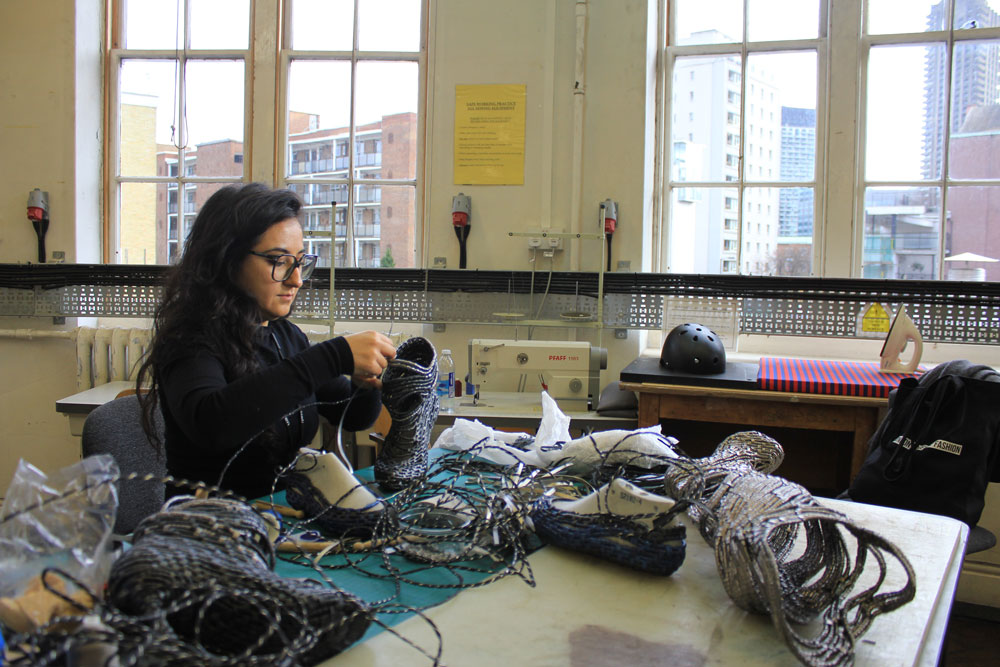Can you imagine how long it would take to hand-weave an entire collection of shoes from one single thread? Neither can we, but towards the end of last year we spent an afternoon with MA Fashion Footwear student and Kering Award finalist for Stella McCartney, Nida Gonul, who did exactly that to find out. For her final project at LCF, Nida implemented a traditional Turkish basket weaving technique to create an entire collection. MA Fashion Footwear will be on display at the LCFMA16 Exhibition.
As Nida made her final touches, and recovered from a hand injury she incurred while working on the collection, she told us about her educational background and what she liked most about studying at LCF.
Tell us about your final collection…
For my final collection I implemented a basket weaving technique from the northern region of Bafra in Turkey, as an alternative way to make shoes. Each shoe is made from a single, continuous, weaved thread.
Why did you decide to take this approach?
I chose this because when I worked and studied in Italy and Turkey in the past, I noticed how attached we are as designers to the factory, and if you have a small order it’s really hard to generate any interest. That was always in the back of my mind, and for years I’ve been thinking about what I can do to detach myself from the factory. I also wanted to look at how we can diversify the work force.
What do you mean by a ‘diverse workforce’?
I mean people with no background in the subject. I experienced first-hand, when I injured my wrist that people who have no background in basket weaving or in shoes, are able to do this technique perfectly if you show them how and give them the time to learn. In my case, some of the people I’ve been working with took two days to learn it, and one girl was very gifted and picked it up immediately. This not only diversifies the work force but also gives you the ability to work anywhere – here at university for example the workshops usually close by five, which can be restricting. I wanted to be less dependent on machinery and technicians, and I am also inspired by the sustainability debate.
How does your sustainable fashion interest influence your work?
I’m always interested in finding alternatives to making any part of the shoe – the upper, the sole – all of it. What I used for this collection is 100% biodegradable coating which is an alternative to polyurethane artificial leather. I’m growing my own material – it’s Kombucha leather – I got the formula from Susanne Lee who is a research fellow at Central Saint Martins. I wanted to make my shoes as sustainable as possible, provided that they were still beautiful. Because in the end, if it’s not beautiful, if we don’t strive to attain beauty and keep it, then what’s the point in the rest?
What did you study before MA Footwear at LCF?
I had no background in shoes – I did my bachelors degree in Turkey in International Relations, and I spent 7 years in an office job doing logistics, so I had to learn everything from scratch. I spent 6 months doing intensive training in Italy and then 5 months doing internships after that. I studied footwear design at Cercal in San Mauro. This is where all the factories are – Guiseppe Zanotti, Gucci, Sergio Rossi – it’s a very small town, but it’s one of the biggest luxury product towns in Italy. It was a very technical course – pattern cutting, heel making and design.
Why did you choose LCF for your MA?
I wanted to do something different – something that would open up my mind and I saw the shoes on LCF’s Showtime and they were really impressive. I compared them to other schools that offer MA Footwear courses and LCF was quite frankly, the best one.
What have you enjoyed the most about your course and what has been the most challenging thing about it?
The most challenging thing I have found is the lack of time – we need more hours in the workshop and more technicians! We have three amazing ones of course, but everyone is always surrounding them which can be a struggle. What I’ve enjoyed most is being able to do what I want. I didn’t work during my degree which meant I could grow my own leather and weave the shoes – if I was working, weaving would have been out of the question. We also have great resources at LCF – like the Centre for Sustainable Fashion, which was an enormous support when I was part of the Kering Award.
What would be your top tips for prospective MA Footwear students?
Get some relevant education beforehand if you can– not necessarily in footwear but in another design area as well. Create a collection that your skills are directly transferable to. If you want to outsource the making that’s fine, but when you’re doing an MA you have all this time and equipment at your disposal, so you can do it yourself. Finally I would say go for everything LCF has to offer – anything I’ve done outside of my course has served me so well and given me as much as my course did.
What are your plans for the future?
I want to work so I’m now applying for internships. I would like to stay in the UK but maybe I’ll go back to Turkey – it all depends on how things go with working for someone else. My dream would be to work with Christopher Kane or Rupert Sanderson but we’ll see what happens.



